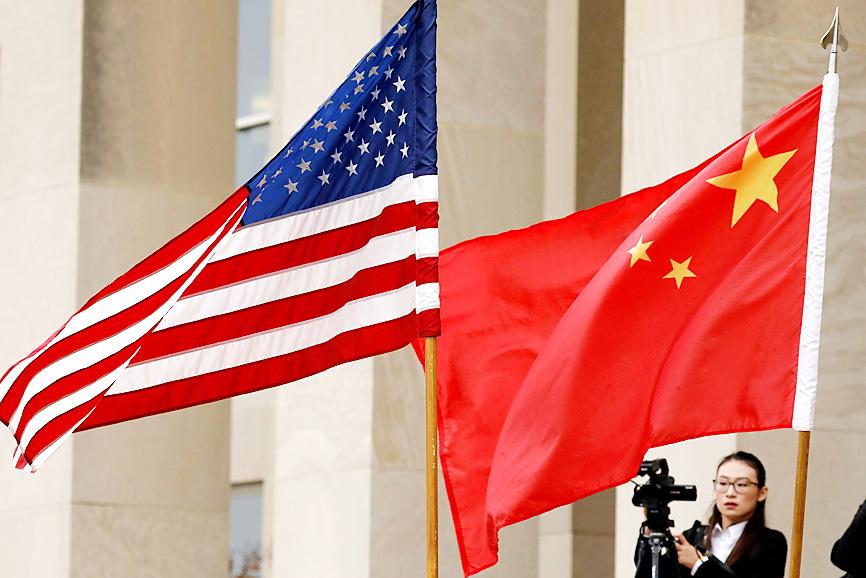The top diplomats from China and the US have exchanged stern warnings over the flashpoint issue of Taiwan, ahead of today’s hotly awaited summit between their leaders.
The virtual meeting of US President Joe Biden and Chinese President Xi Jinping (習近平) comes against a backdrop of rising tensions — in part over Taiwan.
In a telephone call on Friday with Chinese Minister of Foreign Affairs Wang Yi (王毅) to discuss preparations for the summit, US Secretary of State Antony Blinken raised concerns about Beijing’s “military, diplomatic and economic pressure” on Taiwan.

Photo: Reuters
The US Department of State said in a statement that Blinken “emphasized longstanding US interest in peace and stability across the Taiwan Strait” in the call with Wang.
Blinken “expressed concern regarding the People’s Republic of China’s continued military, diplomatic, and economic pressure against Taiwan,” and he “urged Beijing to engage in meaningful dialogue to resolve cross-Strait issues peacefully and in a manner consistent with the wishes and best interests of the people on Taiwan,” the statement read.
Wang warned of the dangers of US actions that might seem supportive of “Taiwan independence.”
“Any connivance of and support for the ‘Taiwan independence’ forces undermines peace across the Taiwan Strait and would only boomerang in the end,” Wang told Blinken, according to a readout of the call released by China yesterday.
China has ramped up military activities near Taiwan in the past few years, with a record number of planes intruding into the nation’s air defense identification zone early last month.
Washington has repeatedly signaled its support for Taiwan in the face of what it has described as Chinese aggression.
Biden has largely kept the tougher approach on Beijing of his predecessor, former US president Donald Trump, with both administrations seeing a rising China as the top challenge of the 21st century.
While the world’s top two emitters of greenhouse gases last week unveiled a surprise agreement to work together on climate change, Washington and Beijing have indicated that they would not give ground on flashpoint issues.
US officials have framed today’s summit as an opportunity to “responsibly manage competition,” while trying to cooperate in areas where the two align.
Xi last week warned against the return of Cold War-era tensions in the Asia-Pacific region.
Biden and Xi have talked by telephone twice since the veteran Democrat moved into the White House. The pair also met extensively when Biden was former US president Barack Obama’s vice president and Xi was vice president to former Chinese president Hu Jintao (胡錦濤).
Biden had hoped to meet Xi at a recent G20 summit in Rome, but the Chinese leader has not traveled since the start of the COVID-19 pandemic, and instead, agreed to hold virtual talks by the end of the year.
Additional reporting by CNA

Right-wing political scientist Laura Fernandez on Sunday won Costa Rica’s presidential election by a landslide, after promising to crack down on rising violence linked to the cocaine trade. Fernandez’s nearest rival, economist Alvaro Ramos, conceded defeat as results showed the ruling party far exceeding the threshold of 40 percent needed to avoid a runoff. With 94 percent of polling stations counted, the political heir of outgoing Costa Rican President Rodrigo Chaves had captured 48.3 percent of the vote compared with Ramos’ 33.4 percent, the Supreme Electoral Tribunal said. As soon as the first results were announced, members of Fernandez’s Sovereign People’s Party

MORE RESPONSIBILITY: Draftees would be expected to fight alongside professional soldiers, likely requiring the transformation of some training brigades into combat units The armed forces are to start incorporating new conscripts into combined arms brigades this year to enhance combat readiness, the Executive Yuan’s latest policy report said. The new policy would affect Taiwanese men entering the military for their compulsory service, which was extended to one year under reforms by then-president Tsai Ing-wen (蔡英文) in 2022. The conscripts would be trained to operate machine guns, uncrewed aerial vehicles, anti-tank guided missile launchers and Stinger air defense systems, the report said, adding that the basic training would be lengthened to eight weeks. After basic training, conscripts would be sorted into infantry battalions that would take

EMERGING FIELDS: The Chinese president said that the two countries would explore cooperation in green technology, the digital economy and artificial intelligence Chinese President Xi Jinping (習近平) yesterday called for an “equal and orderly multipolar world” in the face of “unilateral bullying,” in an apparent jab at the US. Xi was speaking during talks in Beijing with Uruguayan President Yamandu Orsi, the first South American leader to visit China since US special forces captured then-Venezuelan president Nicolas Maduro last month — an operation that Beijing condemned as a violation of sovereignty. Orsi follows a slew of leaders to have visited China seeking to boost ties with the world’s second-largest economy to hedge against US President Donald Trump’s increasingly unpredictable administration. “The international situation is fraught

GROWING AMBITIONS: The scale and tempo of the operations show that the Strait has become the core theater for China to expand its security interests, the report said Chinese military aircraft incursions around Taiwan have surged nearly 15-fold over the past five years, according to a report released yesterday by the Democratic Progressive Party’s (DPP) Department of China Affairs. Sorties in the Taiwan Strait were previously irregular, totaling 380 in 2020, but have since evolved into routine operations, the report showed. “This demonstrates that the Taiwan Strait has become both the starting point and testing ground for Beijing’s expansionist ambitions,” it said. Driven by military expansionism, China is systematically pursuing actions aimed at altering the regional “status quo,” the department said, adding that Taiwan represents the most critical link in China’s